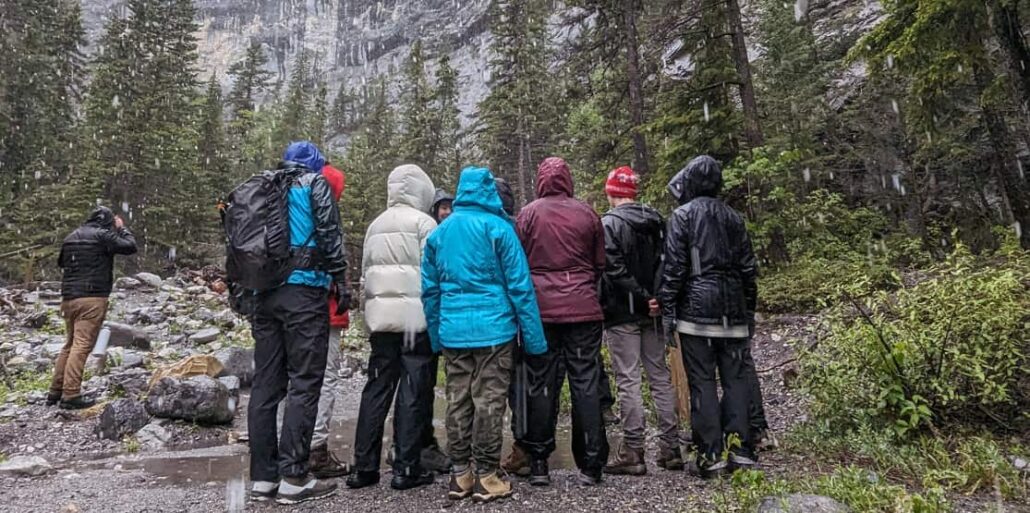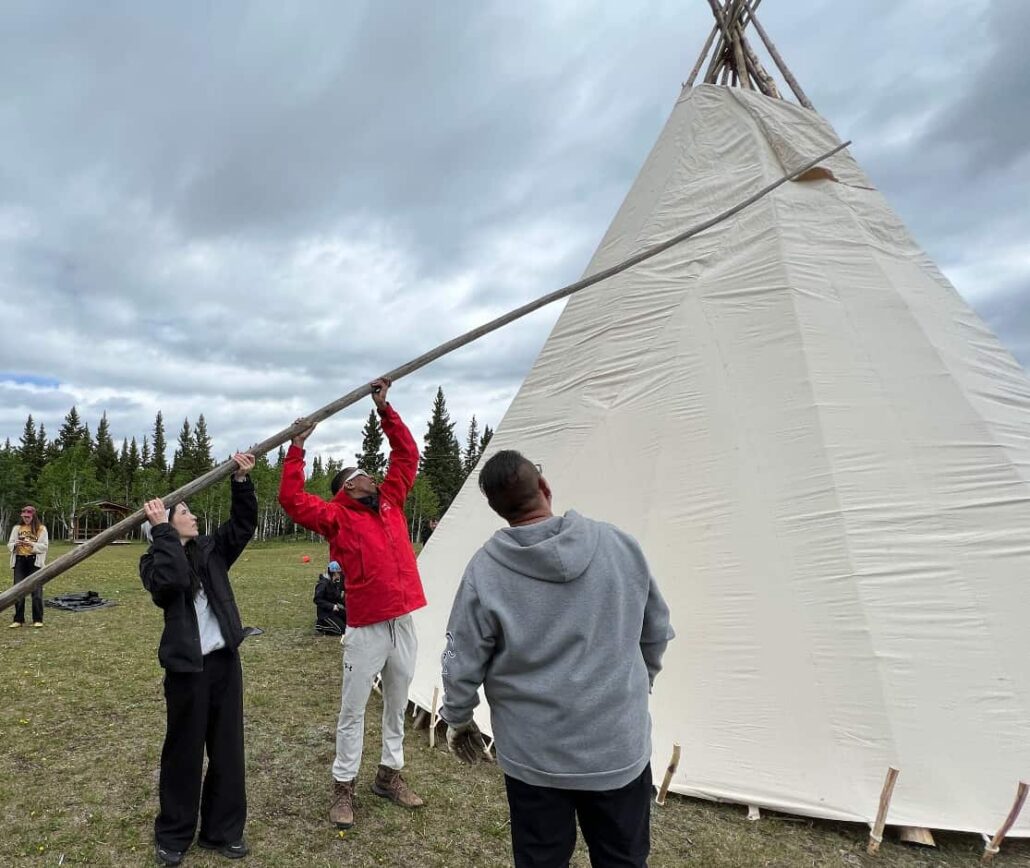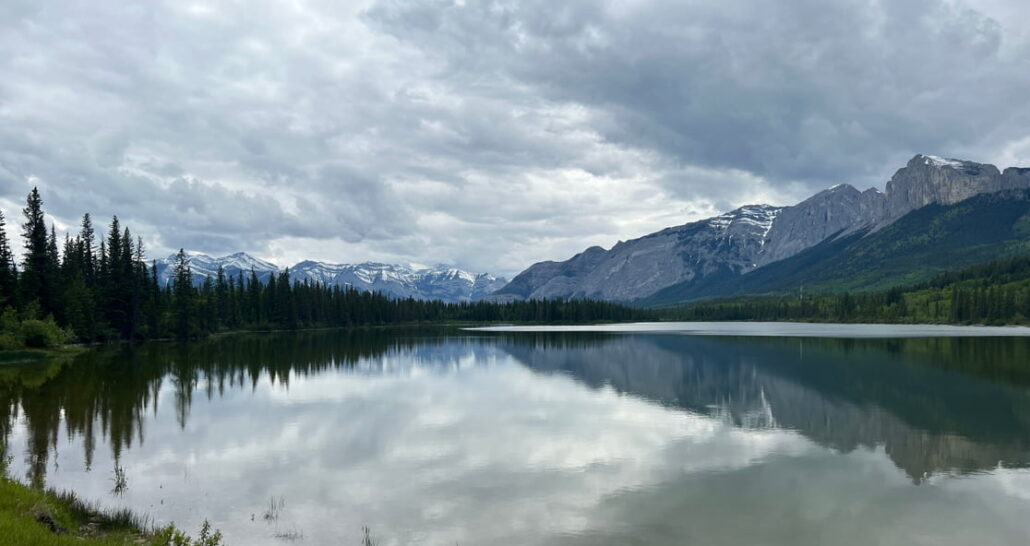By Shahla Gulistani
This summer, I had the incredible opportunity to participate in the Howl Experience, a land-based learning program at Camp Chief Hector in Kananaskis, Alberta, to further my professional development. The experience, deeply rooted in the teachings of the Stoney Nakoda Nation, was transformative and has left a lasting impression on me both personally and professionally.
Land-based learning is an educational approach that emphasizes the interconnectedness of land, culture, and community. It involves direct engagement with the natural environment and the cultural practices associated with it. This method is particularly resonant with Indigenous teachings, where learning is not confined to the classroom but is an immersive experience in nature. Land-based learning goes beyond traditional education, encouraging mindfulness, respect, and a sense of responsibility towards the earth. For me, it was about cultivating a reciprocal relationship with the land—one that is sustainable and respectful.
In the Howl Experience, land-based learning was a central theme, guiding our activities and interactions. From hiking in the wilderness to participating in traditional ceremonies, every moment was an opportunity to learn from the land and the people who have stewarded it for centuries. This immersive approach was not just about acquiring knowledge but about forming a connection with the land and understanding its significance in the broader cultural and ecological context.

The program began with an opening circle, setting the stage for the week ahead. This circle was an introduction to the journey we were about to embark on and a moment to center ourselves and connect with one another. We were joined by the Stoney Nakoda Elders, who welcomed us to their space and shared pieces of their traditions with us. I was introduced to smudging, a practice of purification and cleansing that involves the burning of sacred herbs, and its purpose is to cleanse the mind, body, and spirit. It was a profound reminder of the importance of mental and spiritual well-being and the need to take time to reflect and feel gratitude.
At the circle, the Elders spoke about the importance of introduction in Indigenous cultures. “Who are you? Where do you come from?” are two fundamental questions that not only foster a sense of belonging but also help solidify identities. These questions encourage individuals to reflect on their personal histories and cultural roots, creating a deeper understanding of themselves and their place in the world. By sharing our stories, we connect with others on a more profound level, breaking down barriers and forming meaningful relationships. This practice underscores the value of knowing and honouring one’s heritage, as well as recognizing the diverse backgrounds that make up a community. It promotes a culture of respect and inclusivity, where every voice is valued, and every story is seen as a vital part of the collective narrative.
It was a simple yet profound start. Here at Engage Delaney, we also emphasize the importance of opening circles in our engagement activities, whether in-person or virtual; our goal is to create a safe space where everyone feels included and respected. This process of self-exploration and mutual recognition is essential in building more inclusive and empathetic communities and spaces.
As community building was a central theme throughout the program, the Stoney Nakoda Nation’s traditions and ceremonies highlighted the importance of coming together, supporting one another, and fostering strong relationships. Participating in activities and rituals such as building and raising a tipi, pipe ceremonies, Pow Wows and preparations for the Sundance ceremony, in addition to being deeply spiritual experiences, were also hands-on lessons in collaboration and respect for the land. These experiences reinforced the idea that community and culture are inseparable and that maintaining these traditions is vital for the well-being of the community. Volunteerism played a key role in this as it underlined the importance of giving back and contributing to the community. It was an invaluable experience that reminded me that community and public service is not just about professional responsibilities but also about personal commitment and the willingness to support and uplift others.

Needless to say, this experience has had a significant impact on me, both personally and professionally. Personally, it was a journey of self-discovery and reflection. As a member of the Hazara ethnic group from Afghanistan, I found many historical and cultural parallels between the Indigenous communities and my own heritage. Both cultures have a profound respect for the land and place great importance on community and spiritual practices. This realization reinforced the idea that despite the differences in our backgrounds, there are universal themes of resilience, community, and respect that connect us all.
Professionally, my journey with the Howl program has profoundly influenced my perspective on engagement and community work. The teachings and experiences have equipped me with a deeper appreciation for the importance of cultural sensitivity, indigenous protocols, environmental sustainability, and community building. As I return to my role as an engagement and data insight coordinator with Engage Delaney, I am committed to integrating these lessons into my work. As we move forward, it is essential to continue building bridges, honouring the wisdom of Indigenous teachings and fostering a spirit of community and collaboration.
In a world where the pace of life often leaves little room for reflection, this program offered a sanctuary for growth and renewal. It reminded me that true learning happens when we step outside our comfort zones, embrace new perspectives, and connect deeply with the world around us.

As a last piece of reflection, I want to leave you with this: land-based learning is not a one-time experience but an ongoing journey. It encourages continuous learning and reflection, urging individuals to stay connected with the land and the cultural teachings that stem from it. The Howl Experience has instilled in me a deeper appreciation for the land and a commitment to advocate for its preservation. As we continue to learn and grow, it is essential to remain open to the lessons the land has to offer and to share these insights with others.
To capture and share the essence of this incredible journey, I created a short video highlight of my trip. This video encapsulates the beauty of Kananaskis and Alberta, and the powerful moments of learning and connection that I experienced. You can view the video here: Watch the Howl Experience Highlight.
Thank you for taking the time to read about my reflections. I hope this inspires you to engage deeply with the land, respect the rich cultural traditions around us, and contribute to building inclusive and resilient communities.
